- Home
- Richard Lee Byers
The Black Bouquet Page 5
The Black Bouquet Read online
Page 5
Sidestepping out from under the threat of the curved sword, he lashed the bugbear across the ribs and kicked it in the knee. It stumbled, and that brought its head low enough for him to bash it a second time, and a third. The goblinoid collapsed unconscious.
Aeron pounced atop the bugbear and poised an Arthyn fang at its throat. The human Red Axe, who was lunging forward, hesitated.
“Stay back,” Aeron panted, “or I’ll kill it.”
The guard spat, “I never liked him anyway. I think he cheats.”
“If you’re such a dunce that a bugbear can trick you,” Aeron shot back, “you deserve to lose your coin. Now, you may not like the brute, but I’ll bet your chief finds it useful. Useful enough that he wouldn’t appreciate you throwing away its life when it can be avoided.”
“Maybe. What do you want?”
Aeron nodded toward the windlass and said, “First, raise the portcullis.”
He had no intention of squirming through the bars again when it was time to leave.
The guard grumbled, “That’s a two-man job.”
“The damn thing has a counterweight,” Aeron said. “Just put your back into it.”
Grunting with effort, or the petulant pretense of it, the Red Axe managed to do as instructed. The chain clanked as it wound around the reel.
“Now what?” the guard asked.
“Now you go into the house and tell Kesk to come out alone for a private talk. Tell him that if he doesn’t show himself in the next five minutes, the cardsharp here dies, and he can forget about ever taking possession of the saddlebag.”
The sentry stood and stared at him.
“What are you waiting for? Go!”
The Red Axe disappeared through the door, slamming it behind him, and after that, Aeron had nothing to do but listen for approaching footsteps, at least until the bugbear stirred. He pressed the keen edge of his knife against his captive’s throat, drawing the goblin-kin’s attention to it.
“Don’t move,” he said, “or you’re dead.”
“Don’t matter,” the bugbear said, its bestial voice slurred. Evidently it was still dazed from the beating it had taken.
“You don’t care if I kill you?”
“Don’t matter you didn’t do … what you was told. You’re still going to die.”
Still? What did that mean, precisely? Aeron would have asked, but at that moment, Kesk Turnskull stalked through the door.
If ever a creature was born to rule a company of cutthroats, Kesk was surely the bully in question. Short and stooped as he was, his muscular body looked nearly as thick as it was tall. Patches of coarse hair bristled from his leathery gray hide, and with its truncated snout and jutting tusks, his face resembled that of a wild boar. Despite the oil lamp burning beside the door, the interior of the water gate was dark enough to reveal the faint luminescence of his scarlet eyes, which smoldered like coals beneath a low, ridged brow.
Aeron had heard that tanarukks hadn’t always existed, that the race had emerged only in recent times as the result of crossbreeding between orcs and demons. He himself had no firsthand knowledge of such esoterica, but thought that anyone who laid eyes on Kesk would have no difficulty crediting the story.
As always, the founder and master of Oeble’s most vicious gang carried a heavy, double-bitted battle-axe in his hand. Supposedly, he’d plundered the enchanted weapon from the body of a fallen foe, a gold dwarf champion who’d believed the axe, a cherished family heirloom, would only serve a pure-hearted warrior of his own race. Kesk liked to tell the story of how he’d proved the fool wrong by using it to slaughter the dwarf’s own kin.
The tanarukk regarded Aeron and the bugbear. It was difficult to read the expression on that swinish face, with its protruding lower jaw, but he seemed to be sneering.
“What’s the point of this?” Kesk growled. “Why didn’t you come to the house through the Underways, as I told you to?”
“If I had, would I be dead already? Did you have some of your murderers lying in wait for me?”
Kesk’s red eyes narrowed and he asked, “What are you talking about?”
“According to the bugbear, you meant to kill me.”
“You can’t club Tharag over the head and expect him to talk sense. He doesn’t do much of that at the best of times. Now, if he’s smart, he’ll shut his hole and let the two of us palaver.”
“You expect me to forget what he said?”
“Just use your own head, will you?” Kesk replied. “Why would I hire a man to do a job, then kill him? To get out of paying? I buy stolen and smuggled goods all the time, and a gang chief has to deal fairly. If I picked up a reputation for cheating, no one would do business with me.”
When Kesk put it that way, it did seem to make sense, yet Aeron found he wasn’t ready to let the topic go.
“You’d betray a hireling in the blink of an eye if it was worth your while, particularly if you thought you could make him disappear with no one the wiser.”
“We agreed on a nice fee for your work, but hardly large enough to beggar me, or make me go to the trouble to play you false. I don’t see the saddlebag. Where is it?”
“Somewhere safe.”
“It’s like that, is it?”
“I lost three friends stealing that box.”
“Which means you don’t have to split up the coin,” said the tanarukk. “You can keep it all, and wind up four times richer than you expected. Be satisfied with that. Don’t think you can grind me for more.”
“You knew to send us after the box, so maybe you knew how well protected it was. But you didn’t warn me.”
Kesk snorted—a wet, ugly sound like a pig oinking—and said, “I thought you knew the game, redbeard. I thought you were a man. When a job gets bloody, a man doesn’t weep and whine about it.”
“Right. A man hits back when someone sets him up for a fall.”
The tanarukk glared and said, “Why wouldn’t I tell you everything I knew about the … the box? I wanted you to get away with it, didn’t I?”
“Maybe you feared that if I knew what I was getting into, I wouldn’t take the job. Or maybe you hoped some of my crew would get killed. That would save you Red Axes the trouble of slaughtering us all yourselves.”
“I told you, we weren’t planning to kill you. Maybe we still won’t, provided you come to your senses. The War Leader knows, you’ve got a death coming for this harebrained stunt here tonight, but I’ve got other meat to chew. Now, where’s the lockbox?”
“What’s it worth to you, really?”
Kesk quivered, quite possibly with the urge to charge and attack.
“Curse you, human,” the gang leader said, “we had a deal, and no one goes back on a bargain with me!”
“I’m not reneging, exactly,” said Aeron. “It’s just that I charge extra for every lie and lost partner.”
“You don’t know what you’re getting into. If you’ve got any brains at all, you understand I can’t let folk cross me and live to brag about it, or else I’m finished in this town. But even that isn’t the whole of it.”
“You’re starting to bore me, Kesk. Perhaps someone else will pay a fair price for the coffer.”
The tanarukk shuddered, and the corner of his mouth twitched and drooled around the jutting tusk and fangs.
“All right,” Kesk said. “I’ll give you five times as much as we agreed on.”
“Ten, and we’ll make the trade at a place and time of my—”
The flame in the oil lamp flared, momentarily illuminating the shadowy gate as brightly as the noonday sun. Aeron had the misfortune to be looking in the general direction of the blaze, and it dazzled him.
He didn’t know how Kesk had accomplished the trick. Maybe it was some innate capacity derived from his demonic heritage. But he didn’t even need to hear the pounding footsteps to comprehend why the tanarukk had manipulated the flame. Kesk had had his back to the lamp, so he hadn’t been blinded, and he was charging in to attack h
is startled, crippled foe.
Aeron flung himself to the side. Something whizzed past his head, just missing, judging from the breeze. He assumed it was Kesk’s battle-axe.
Tharag roared something in the uncouth language of his kind, reminding Aeron that he had two foes, not just one.
Damn it!
He should have taken a split second to knife the bugbear before rolling clear, but had been too rattled to think of it.
He couldn’t battle both of them, not when all he could see was spots and blobs swimming before his eyes. Truth to tell, he wouldn’t have bet on his ability to outfight Kesk under any conditions. He had to get out of there.
Aeron sensed something lunging at him. He jumped backward, with a sick certainty that it wasn’t enough to save him, then heard two bodies smack together and Kesk bellow in frustrated rage. Evidently he and the bugbear had rushed Aeron at the same instant, and on the fairly narrow platform, had gotten in each other’s way.
Aeron knew it had only bought him a second, time he needed to use to leap back down into the water, where his foes’ axe and scimitar couldn’t reach him. But which way was it? Blind as he was, disoriented from dodging, he was no longer sure.
All he could do was take his best guess. He ran—one stride, a second—and pitched into empty space. He felt a split second of elation, then he crashed down on a solid surface.
For an instant, stunned, Aeron couldn’t grasp what had gone wrong, let alone what to do next. Finally it came to him that he’d landed inside one of the boats. The craft bounced as someone else jumped in with him.
Aeron scrambled backward, bumped into the gunwale, and swung himself over the side. His maneuver tipped the craft, and Kesk cursed as he struggled to keep his balance.
Aeron plunged into the water, then struck out in what he prayed was the direction of the river. A missile of some sort, a thrown dagger, perhaps, splashed down beside him. Finally his vision began to clear, and he saw he was headed the right way.
As he reached the mouth of the gate, he glanced backward, and felt a jolt of terror. Kesk held his battle-axe poised for a swing at the chain that held the portcullis in the raised position. The weapon’s edge glowed scarlet as he activated some magic bound in the steel.
Aeron hurled himself forward. Metal clashed, chain clattered, and the grille dropped just behind him, kicking up a little wave that carried him a few feet farther out into the Scelptar.
The trick then was to make it safely ashore. Aeron thought Kesk would send the Red Axes to prowl along the riverside, but if he kept on swimming as fast as he could, he reckoned he’d be able to make it onto dry land before the tanarukk could organize the search.
The dirty, dark-haired boy cowered in the corner, for Sefris had hurt him until the pain burned all the resistance out of him. She’d needed a deft touch to avoid marking him. It was all right that he already carried a street urchin’s usual collection of bruises and scrapes, but he wouldn’t be deemed acceptable if she herself spilled so much as a drop of his blood before the ceremony started. That was just the way it worked.
Thanks to his terrified passivity, she didn’t need to worry about his trying to bolt through the door. She could sit by the window and watch the moon sink toward the horizon. She couldn’t start until the Dark Goddess’s twin sister and greatest foe exited the sky.
Sefris had found the skinny, ragged child begging at a busy intersection. Perhaps he stole as well, when the opportunity arose. Representing herself as a simple traveler and devout worshiper of Ilmater, god of pity, she feigned horror at the discovery of a child so young reduced to such wretched circumstances. She insisted on spiriting him away for a hot supper, a bath, and a new suit of clothes.
At first, wary, he’d been reluctant to go, but with gentle persistence, she persuaded him. Evidently feeling at ease, he started to prattle merrily as they strolled along, but the words caught in his throat as soon as she ushered him into the cramped little flat where, supposedly, her brother and his wife were putting her up.
Upon reaching Oeble, she’d known she needed a private place in which to sleep and perform her rituals, so she’d cleared one out. The broken corpses of the previous tenants sprawled where they’d fallen. The boy froze and gawked at them, which made it easy to relieve him of his knife, immobilize him, and administer as much punishment as required.
Eventually Selûne hid below the horizon like a pale ghost creeping back into its grave. Sefris rose and advanced on the beggar.
“Don’t struggle,” she said. “It will only make it worse.”
Actually, she doubted it could get much worse, but he presumably didn’t know that.
Something in her expression or the way she moved must have alerted him, however, because he finally made a scramble for the door. It didn’t matter. She pounced on him, paralyzed him by applying pressure to the proper part of the spine, and laid him on the table she’d cleared to serve as a makeshift altar. She chanted the first invocation as she tore his clothes away.
Most sacrifices required scalpels, lancets, and such to pick apart the offering in just the proper way. Sefris took a cold satisfaction in the fact that her fingers were strong and skillful enough for her to achieve the same sort of excruciating precision barehanded. As a result, life lingered until she performed the final mutilation, drawing forth the glistening intestines and looping them to form a mystic sigil on the victim’s chest. The boy flopped once like a fish out of water then expired—gratefully, more than likely.
At the same instant, purple light and a wave of chill pulsed across the room. Unsurprised, for it was the desired result of the ritual, Sefris turned. Before her stood what appeared to be a gaunt human male with the long-eared head of a jackal. Its voluminous robes were black, and its body was outlined by a hazy sheath of flickering violet flame that somehow burned cold instead of hot. The garment and fire together made the arcanaloth a living emblem of the Lady of Loss for those with the wit to understand.
The fiend took a disdainful glance around the hovel, with the untidy litter of corpses, then turned its dark eyes back on Sefris. Few mortals could have abided that gaze, freighted as it was with a malice as deep and as wide as the ocean, but it didn’t faze the monastic. Indeed, she respected it as essentially the same attitude she herself had striven so diligently to cultivate.
“Dark Sister,” the arcanaloth said, acknowledging her, a hint of a canine yip in its tenor voice, “what do you want?”
In Sefris’s experience, arcanaloths—the scribes and mystics of their infernal race—were generally direct to the point of rudeness. In and of itself, it didn’t bother her. She shared that trait with them as well.
“Do you know why my Dark Father sent me to Oeble?”
The jackal-headed fiend wrinkled its muzzle in a sneer.
“I know,” it said. “Mortal foolishness.”
“Neither one,” Sefris replied. “When my order assigns me a task, it’s because the deity whom you and I both serve wishes it done.”
“I have my own essential tasks awaiting me in Shadow.”
Sefris reminded herself that while hatred was a virtue, impatience was not, and she took a breath to steady herself.
“Was the offering acceptable, or not?”
The arcanaloth shrugged and replied, “It was all right.”
“Then I’ve paid your price, and you’ll either help me or suffer the consequences of your refusal.”
The fiend rolled its eyes and asked, “What help do you require?”
“I’ve never been to Oeble before. I’m confident I can kill whoever currently holds The Black Bouquet, but less sure of my ability to find it. That’s where you come in. Your magic is more versatile than mine, so you’re gong to cast a divination.”
“Very well.”
The spirit waved its hand, and a long oval mirror in a golden frame appeared on the wall. It was so highly polished that it almost seemed to glow with its own inner light and so manifestly valuable as to appear grossly inco
ngruous in such humble surroundings. Sefris assumed the fiend had summoned the looking glass from its own extradimensional realm.
The arcanaloth used its claws to tear loose a scrap of the offering’s flesh, which it then ate. Sefris had the feeling that wasn’t part of the conjuring. The fiend was simply peckish. When it was done nibbling, it dipped its forefinger into one of the boy’s wounds, coating the digit with blood that it employed to write arcane signs along the curved edge of the mirror. The runes burned with the same purple flame that surrounded the creature’s body.
After that, the arcanaloth stared intently into the mirror. Peering past it, Sefris could no longer see anything coherent in the glass, not even their own reflections, just formless shadows that oozed, merged, and divided. But then, she wasn’t the scryer. She assumed the fiend was making more sense of the rippling blackness than she could.
Or at least she did until the arcanaloth abruptly barked an incantation in some demonic language and swept its arms through a complex mystic pass. At that moment, its annoyance was unmistakable. The bloody sigils burned brighter, but the vague shapes flowing inside the glass became no clearer.
“What’s the matter?” Sefris asked.
“The Dark Goddess’s enemies warded their plunder against attempts at divination. They must have anticipated that someone would try to take it back.”
Well, Sefris thought, at least that means they can’t use magic to find it either, but the notion was precious little consolation.
“Surely you can do something,” she said.
“Not necessarily, and the effort would take a great deal out of me. I told you, I have my own responsibilities to—”
“Do it.”
The arcanaloth bared its fangs and said, “We may meet again someday, on my own plane, perhaps, in circumstances where I hold the whip. If so, you might be glad you didn’t push me too hard.”
“Do as I command you, or I’ll speak the words of torment,” Sefris replied. “By darkness impenetrable and empty—”

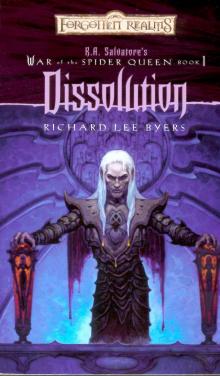 Dissolution
Dissolution Arkham Horror- Ire of the Void
Arkham Horror- Ire of the Void The Haunted Lands: Book II - Undead
The Haunted Lands: Book II - Undead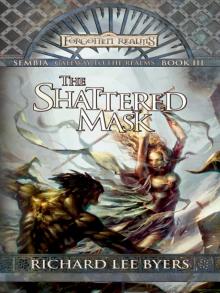 The Shattered Mask
The Shattered Mask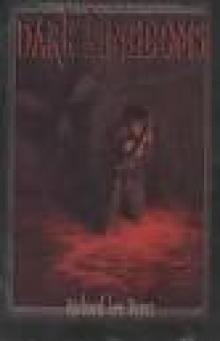 Dark Kingdoms
Dark Kingdoms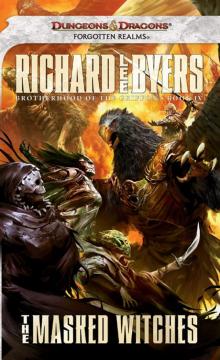 The Masked Witches: Brotherhood of the Griffon, Book IV
The Masked Witches: Brotherhood of the Griffon, Book IV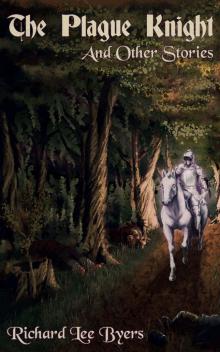 The Plague Knight and Other Stories
The Plague Knight and Other Stories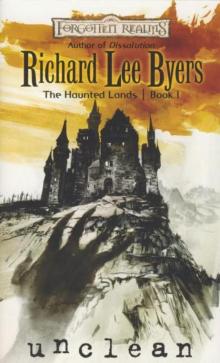 Unclean: The Haunted Lands
Unclean: The Haunted Lands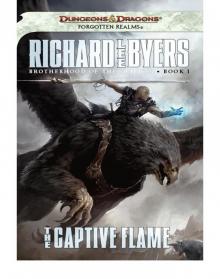 The Captive Flame: Brotherhood of the Griffon • Book 1
The Captive Flame: Brotherhood of the Griffon • Book 1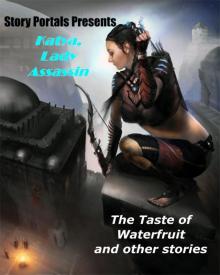 The Taste of Waterfruit and Other Stories (Story Portals)
The Taste of Waterfruit and Other Stories (Story Portals)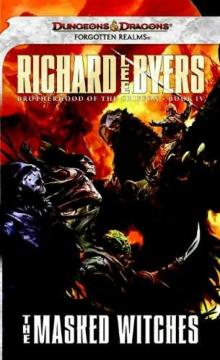 The masked witches botg-4
The masked witches botg-4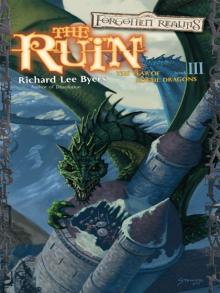 The Ruin
The Ruin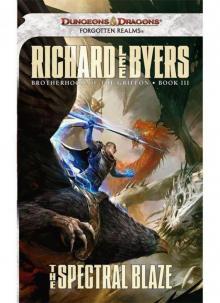 The Spectral Blaze botg-3
The Spectral Blaze botg-3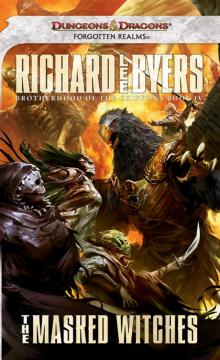 The Masked Witches
The Masked Witches Blind God's bluff bf-1
Blind God's bluff bf-1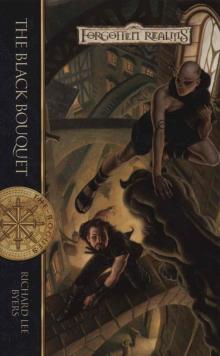 The Black Bouquet r-2
The Black Bouquet r-2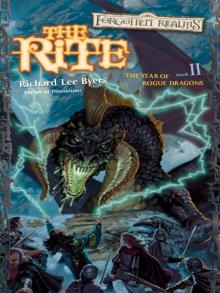 The Rite
The Rite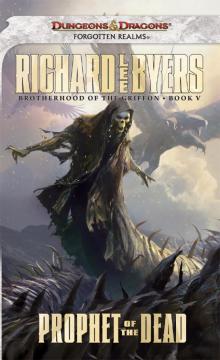 Prophet of the Dead: Forgotten Realms
Prophet of the Dead: Forgotten Realms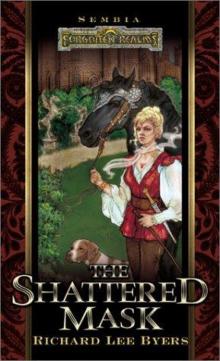 The Shattered Mask s-3
The Shattered Mask s-3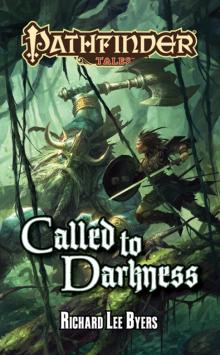 Called to Darkness
Called to Darkness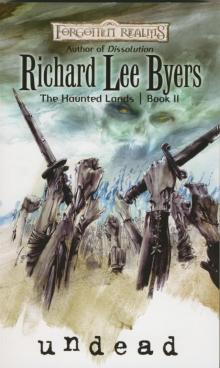 Undead hl-2
Undead hl-2 Blind God's Bluff: A Billy Fox Novel
Blind God's Bluff: A Billy Fox Novel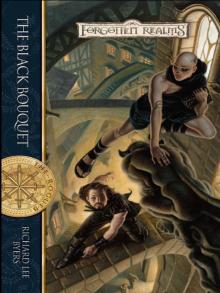 The Black Bouquet
The Black Bouquet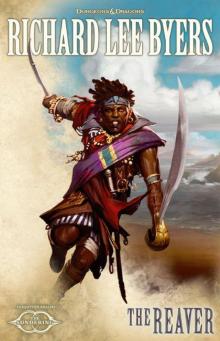 The Reaver
The Reaver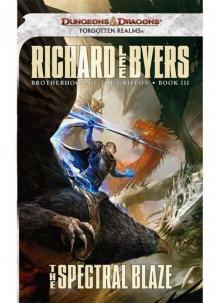 The Spectral Blaze: A Forgotten Realms Novel
The Spectral Blaze: A Forgotten Realms Novel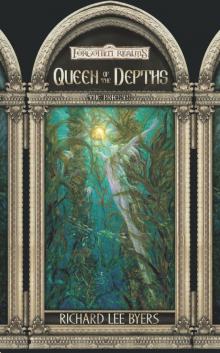 Queen of the Depths
Queen of the Depths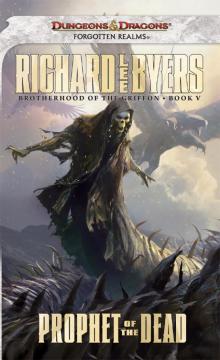 Prophet of the Dead botg-5
Prophet of the Dead botg-5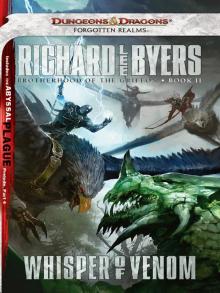 Whisper of Venom: Brotherhood of the Griffon, Book II
Whisper of Venom: Brotherhood of the Griffon, Book II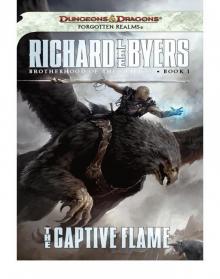 The Captive Flame botg-1
The Captive Flame botg-1 The Haunted Lands: Book III - Unholy
The Haunted Lands: Book III - Unholy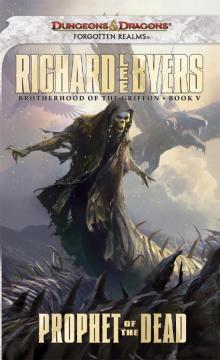 Prophet of the Dead
Prophet of the Dead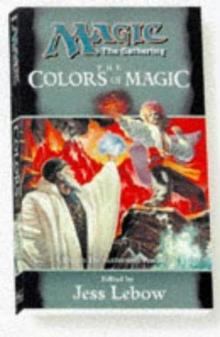 The Colors of Magic Anthology (magic: the gathering)
The Colors of Magic Anthology (magic: the gathering)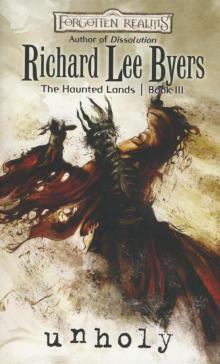 Unholy hl-3
Unholy hl-3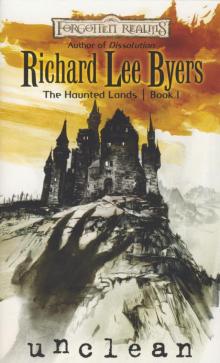 Unclean hl-1
Unclean hl-1 Blind God's Bluff
Blind God's Bluff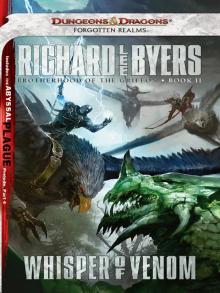 Whisper of Venom botg-2
Whisper of Venom botg-2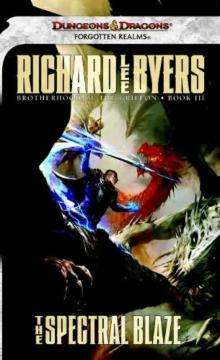 The Spectral Blaze
The Spectral Blaze